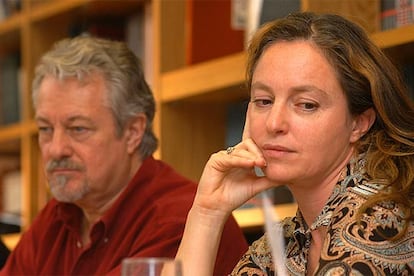José Manuel Gorospe is one of those figures who have traveled sixty years of Spanish theater from different positions, trades, attitudes; Always, yes, working in favor of the work, in favor of the growth and prestige of the performing arts, to which he was delivered from a young age, in the seventies, as founder and director of the Chamber Theater of the Great Kursaal of San Sebastián, a city where he was born in 1943. This Thursday Gorospe has died in Madrid at age 81.
In that decade Gorospe also joined, performing administrative and technical functions, to the Goliardos, one of the most important groups of the Spanish independent theater for something later to work in theatrical productions Manuel Collado, one of the professionals of the most outstanding scene of the seventies and eighties.
As a cultural manager, at a time when that label did not exist, he organized the first San Sebastián Theater Festival, better known as San Sebastián Zero Festival. It was the time when he also liked to work as an actor, because he was one of the many tasks that interested him in the film and scenic profession. In fact, he exercised, and much, as a technical expert, producer, cultural manager, dubbing actor … and Tertulian with each of the many friends and acquaintances he made in his profession.
In cinema he debuted in the feature film with Pedro Lazaga Advanced position (1966), with Pedro Olea worked in Old color days (1968), Akelarre (1984) y Black flag (1986), and with José A. Zorrilla in To the four winds (1987).
Gorospe was, for five years, technical director of the Palace of Festivals (Victoria Eugenia Theater) of the San Sebastián Film Festival; work that combined with, for example, to be a producer of fundamental works of the theater in the transition as The Lady of Alexandria, From Calderón de la Barca, by the company of Aurora Bautista, a show that reopens the rebuilt Spanish theater in Madrid in 1980, after suffering one of its various fires.
Next, in the Public Administration, the Donostiarra served as mayor at the Mérida Theater Festival and at the Segovia Music, Theater and Dance Festival; He was manager of the National Ballet of Spain, led by Antonio; And he worked as a production leader at that time, the newly created lyrical production unit at the Teatro de la Zarzuela.
As of 1986, the production of shows is more firmly involved, such as the Be able to by Miguel de Unamuno, which premieres at the Roman Theater in Mérida, something that combines with the responsibility of finishing the renewal works of the Arriaga Theater in Bilbao, carrying out the technical start -up. Gorospe produced the opera for the Basque Government Amaya, by Jesús Guridi, directed by Enrique García Asensio, who reopens the theater. Shortly after he was appointed attached to the direction of the Palau de la Música and Congresos de València.
In 1990 it became the gEnter of the Culture Area of the State Centennial State Society and shortly thereafter he advised on the completion of the works of the New Theater of Madrid, of the Madrid City Council. From that institution he was appointed director, and proposed the general exploitation plans, proceeding to the selection of the personnel and beginning the management, important because in 1992 the Chamber welcomed the lyrical program of the European cultural capital of Madrid. Two years older, returned to San Sebastián as an auditor of the project, and technical advisor to the execution works, of the Kursaal Congresses Palace.
On his back of his hometown to Madrid, Gorospe resumed his production work in the capital with The avoidable ascension of Arturo UI by Bertolt Brecht, who under the scenic direction of José Carlos Plaza premiered at the Teatro Bellas Artes. From there he went to the National Classical Theater Company, as a production director, a position he also worked at the Teatro de la Zarzuela. In 2004, he signed as Festivals Director of the General Directorate of Cultural Promotion of the Community of Madrid and we must not forget that it was, within the lyrical activity, directly responsible for 34 opera and 33 productions in Zarzuela.
Gorospe, who had turned 82 next Wednesday, let his body be donated to science, so, as he wanted, there are no tanatories, farewell or funeral ceremonies, although friends have already begun to organize an act of celebration for their friendship.

